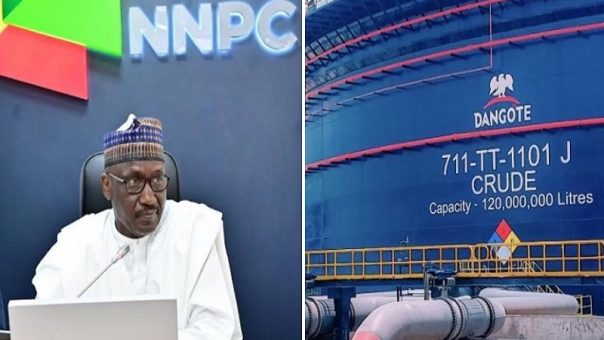NNPCL denies ending naira-for-crude deal with Dangote refinery

The Nigerian National Petroleum Company Limited (NNPCL) has strongly refuted claims alleging the termination of the Naira-for-Crude agreement with Dangote Refinery.
NNPCL emphasised that it has consistently supplied the refinery with a total of 84 million barrels of crude oil since the refinery began its operations in 2023.
In a statement on Monday, the NNPCL Chief Corporate Communications Officer, Olufemi Soneye, stated that discussions for the renewal of the agreement are currently ongoing, with the aim of establishing a new contract.
Soneye also stated that under the deal initiated in October 2024, the 650,000-capacity refinery has received 48 million barrels to refine petroleum products.
The statement titled “Clarification on the Naira Crude Contract Between NNPC Limited and Dangote Refinery”, explained that the agreement for the sale of crude oil in naira was structured as a six-month contract and is set to expire at the end of March 2025.
The statement read, “NNPC Limited has noted recent reports circulating on social media regarding the alleged unilateral termination of the crude oil sales agreement in Naira between NNPC and Dangote Refinery. To clarify, the contract for the sale of crude oil in Naira was structured as a six-month agreement, subject to availability, and expires at the end of March 2025.
“Discussions are currently ongoing towards emplacing a new contract. Under this arrangement, NNPC has made over 48 million barrels of crude oil available to Dangote Refinery since October 2024.
“In aggregate, NNPC has made over 84 million barrels of crude oil available to the refinery since its commencement of operations in 2023. NNPC Limited remains committed to supplying crude oil for local refining based on mutually agreed terms and conditions.”
Earlier, there had been reports that the NNPCL had suspended the naira-for-crude oil swap deal with domestic refiners, including Dangote Refinery and other private operators.
The decision, which it was believed took immediate effect, has sparked discussions about its implications for Nigeria’s energy sector and the broader economy.
The naira-for-crude arrangement, introduced on October 1 2024, allowed local refiners to purchase crude oil in naira instead of dollars. The initiative was designed to support domestic refining capacity, reduce reliance on imported petroleum products, and stabilize the local currency by easing pressure on foreign exchange reserves.
The termination of the agreement means that Nigerian refineries, including the much-anticipated Dangote facility, will now have to source crude oil from international suppliers, paying in dollars instead of naira. This shift is expected to escalate operational costs, potentially leading to higher fuel prices at the pump.
According to sources familiar with the development, the NNPC informed local refiners that it has already committed its crude oil production to forward contracts, leaving no supply available for domestic refineries. This revelation comes despite reports that Nigeria’s crude output has increased since the deal first began.
The suspension has raised concerns among industry stakeholders, particularly for the Dangote Refinery, which is poised to become one of Africa’s largest refining facilities.
The refinery, owned by billionaire Aliko Dangote, has been a key beneficiary of the naira-for-crude deal, as it relies on locally sourced crude to meet its refining needs. Analysts fear the suspension could delay the refinery’s operational timeline and increase costs.
Other private refiners, including Waltersmith Petroman and BUA Refinery, are also expected to feel the impact. The deal had provided them with a cost-effective way to secure crude oil feedstock, enabling them to compete with international players.
Economists have warned that the suspension could have ripple effects on Nigeria’s economy. The naira has already faced significant pressure in recent months, and the removal of this dollar-saving mechanism could exacerbate the currency’s volatility.
Additionally, the move may hinder efforts to achieve self-sufficiency in petroleum production, a key goal of the federal government.




